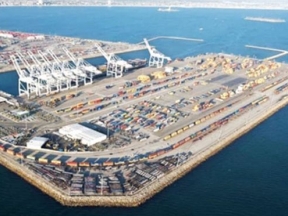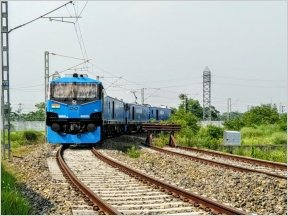According to the Indian Ports Association (IPA), thermal coal imports dropped 23.24 per cent to 34.52 million tonnes (MT) during April-September, while coking coal shipments fell 28.04 per cent to 20.89 MT. Coal volumes at the 12 major ports declined for the sixth straight month in September 2020, the association informs. These ports had handled 44.98 MT of thermal coal and 29.03 MT of coking coal in April-September period of the previous financial year. Together, thermal and coking coal handling saw a decline of 25.13 per cent at these ports in the April-September period at 55.41 MT, the IPA, which maintains cargo data handled by these ports, said in its latest report. Thermal coal is the mainstay of India’s energy programme as 70 per cent of power generation is dependent on the dry fuel, while coking coal is used mainly for steel making. India is the third-largest producer of coal after China and the US, and has 299 billion tonnes of resources and 123 billion tonnes of proven reserves, which may last for over 100 years. In the wake of the COVID-19 outbreak, sharp declines were also witnessed in handling of containers, coal and POL (petroleum, oil and lubricant) among other commodities. The 12 ports witnessed considerable decline in cargo traffic, registering a 14 per cent dip in the first half of the current fiscal to 298.55 million tonnes (MT) as against 348.23 MT during April-September of the last fiscal. Mansukh Mandaviya, Shipping Minister last month said cargo traffic at 12 major ports declined considerably March onwards, adversely impacted by the COVID-19 pandemic. India has 12 major ports under the control of the central government — Deendayal (erstwhile Kandla), Mumbai, …
Read More »Assam to develop Jogigopha as a logistics hub for cargo moving from Arunachal Pradesh to Bangladesh
Assam is all set to have country’s first international multi-modal hub, informs Chandra Mohan Patowary, Assam Industry and Commerce Minister. The Asian Development Bank (ADB) has agreed to fund the project at an estimated cost of around Rs 600 crore. “The Government of Assam is planning to develop Jogighopa, a small township near Brahmaputra river, as a logistics hub or trans-shipment point for cargo moving from Assam, Arunachal Pradesh, Nagaland to Bangladesh,” the minister informs. In addition, the Munshiganj River Terminal in Bangladesh will be used as a customs station to handle third-party export and import cargo via Kolkata Port. “To bring about a significant reduction in logistics cost and faster delivery of Bangladesh export cargo, the Indian side has raised the point regarding permitting a third country export-import trade under the coastal shipping agreement and protocol on inland water transit and trade (PIWTT) by allowing trans-shipment through ports on the east coast of India. The Bangladesh government agreed to hold stakeholder consultations and revert on the matter,” Patowary said. “Increasing connectivity through air, water, rail, road offer a mutually beneficial opportunity for enhancing economic cooperation between Bangladesh and the Northeastern states of India and beyond. Standard operating procedures for the use of Chattagram and Mongla ports for movement of goods to and from India, particularly to and from the Northeast of India have recently been concluded and it is expected that it would create a win-win situation for both economies,” he adds.
Read More »Ministry of Shipping extends 40% discount on cargo movement between India & Chabahar Port in Iran, for one year
The Union Shipping Ministry has extended the current concessional rate of 40 per cent discount on cargo movement between India and Chabahar Port in Iran for a period of one year. The discount will apply for the coastal movement of cargo and vessel related charges, being handled at Jawaharlal Nehru Port and Deendayal Port to Shahid Beheshti Port, Chabahar. The levy of concessional vessel related charges is to be applied proportionately, subject to vessel loading at least 5,000 tonnes cargo to Shahid Beheshti Port. The ports in coordination with Indian Ports Global Limited will jointly evolve a Standard Operating Procedure (SOP) to ensure that discounts are given to cargo actually discharged or loaded at Shahid Beheshti Terminal of Chabahar Port. According to the Ministry, the aim of the extension of discount period is to promote the trade through Shahid Beheshti Port. It will also give a boost to coastal movement of cargo.
Read More »Volga-Dnepr Airlines moves 430 tonnes of power plant equipment to Afghanistan
Volga-Dnepr Airlines in partnership with Blue Water Shipping has carried a series of flights on its Antonov-124-100 ramp aircraft in order to support the new power plant project in Afghanistan. The airline delivered 430 tonnes of equipment for Bayat Power’s Bayat Power Phase 1 project. The equipment was transported on five flights from Al Maktoum (UAE) and Tekirdag Korlu (Turkey) international airports to Mazar-i-Sharif in Afghanistan. The cargo included a 57 tonne transformer with supporting equipment, as well as three units of the newest and world’s first transported Siemens SGT-A45 mobile turbine. The turbine blocks spanned 23 to 30 meters, and weighed 60 to 100 tonnes. They were installed on trailers and transported to the cargo compartment of the Ruslan using special equipment and a flyover. “We started working on it with our partners in October 2018 by developing various loading plans for this unique piece of equipment. It was a challenge in terms of cargo stowage requirements, but our team of experts with almost thirty years of experience was able to successfully solve all the tasks due to constant dialogue and cooperation with our partners. We hope that our work will continue in the future, and that the project to build the power plant will start its work safely and will benefit many people in Afghanistan,” shares Ekaterina Andreeva, Commercial Director, Volga-Dnepr Aviation Company.
Read More »Brussels Airport reports 18.9% increase in volumes this September
With a strong 18.9 per cent increase in volumes observed in September, Brussels Airport has reported an increase in cargo volumes for the fourth consecutive month. The volumes from January to September this year were 0.6 per cent higher than in the same period in 2019. According to Brussels Airport, the growth in all-cargo and express services balanced out the effect of passenger flights being grounded due to the pandemic. Express services maintained growth compared with last year (+33.8%), while the increase in volumes in the cargo sector (+88.8%) accelerated growth in airfreight volumes. Also in September 2020, there was a 40 per cent year-on-year increase in the number of freighter flights operated at the hub. The hub reported a 28 per cent year-on-year increase in number of freighter flights during the first nine months of this year. Brussels Airport added said the number of cargo-only passenger flights (preighters) remains constant.
Read More »Dachser increases network capacity; adds weekly Frankfurt to Shanghai charter for the autumn peak
Dachser Air & Sea Logistics has launched seasonal charters to cope with the expected high demand in the fourth quarter of the year. Explaining the situation, Edoardo Podestà, COO Air & Sea Logistics, says, “The market in Asia has now picked up speed again with production ramping up, and we are seeing increasing tonnages for export. With passenger flights not likely to resume to pre-Coronavirus level, we can expect a lively peak season this year.” He added, “Additional capacities have been created for this purpose.” From mid-October until the end of the year, a Boeing 747-400 will be flying once a week as a full charter between Frankfurt and Shanghai. The company is also handling Europe-wide distribution with its own road network via the Frankfurt Import Gateway. Premium product under current market conditions Dachser has been offering this peak season charter for the third consecutive year. Fixed transit times make the service reliable and enable customers to plan ahead. With the seamless integration of its road and air and sea logistics networks, Dachser is able to respond quickly to changing route situations in Europe and accelerate the pickup and delivery processes. “At Dachser we have a strong global network capability, so we are well prepared for the ‘new normal’ and offer our customers a reliable solution in volatile market conditions,” adds Podestà. The logistics provider is at the same time running weekly charters for the Hong Kong-Frankfurt route and the Transatlantic Frankfurt-Chicago rotation service.
Read More »TIACA & Pharma.Aero call for industry collaboration concerning lack of readiness for COVID-19 vaccines logistics
TIACA together with Pharma.Aero expressed a strong concern over the current state of air cargo readiness for the upcoming COVID-19 vaccines transportation, with only 28 per cent of the industry feeling well prepared for it today. According to the results of our airfreight readiness survey, completed by 181 airlines, freight forwarders, ground handlers, airport operators and solution providers, majority of the industry players have begun preparation to handle, store, transport and deliver the future COVID-19 vaccines. They are setting up dedicated teams, engaging with partners, mapping and upgrading their capabilities, as well as developing new services. As compared to companies which are already in close engagement with vaccines manufacturers, companies not involved in direct conversations with the manufacturers felt the least prepared for the upcoming logistics challenge of vaccines transportation. “We as an industry are as strong as our weakest link. To move the needle on industry readiness, we need to ensure everyone is engaged and informed. Only with a strong and transparent dialogue between pharmaceutical and air cargo sectors, governments, non-governmental organisations and healthcare institutions can we overcome these challenges,” said, Emir Pineda, Member, TIACA’s Board of Director and Co-lead, Sunrays Project, initiated by TIACA and Pharma.Aero this August.
Read More »NLDS extends services to Nepal & Bangladesh; tracks container movement and reduce logistics cost
Utilising its services to improve global logistics, NICDC Logistics Data Services-NLDS (formerly DMICDC Logistics Data Services, DLDS) has extended its services to Nepal and Bangladesh after the consent of Land Port Authority of India (LPAI) to install the RFID readers at Integrated Check Posts (ICPs) at India–Nepal and India–Bangladesh border. With this expansion, exporters and importers from Nepal and Bangladesh can track the movement of their containers through Logistics Databank Portal www.ldb.co.in and a mobile application named ‘NICDC-LDB’. The expansion includes ICPs, namely, Agartala-India-Bangladesh Border, Petrapole-India–Bangladesh border, Jogbani-India–Nepal border, Raxaul-India-Nepal Border With this coverage ICPs located at Agartala, Jogbani and Raxaul will help in road movement container tracking and Petrapole ICP will help in rail movement container tracking. Speaking on the development, K. Sanjay Murthy, IAS, CEO & MD, NICDC (National Industrial Corridor Development Corporation) and Chairman, NLDS says, “The new extension of services reiterates our vision and commitment of streamlining logistics across the country and the brand’s ambition to improve the EXIM trade, reduce the logistics cost and pave the way for India to become a logistics hub.” Ichiro Oshima, CEO, NLDS says, “Since its inception in Dec 2015, NLDS has played a vital role in enhancing the operations of Ports and Maritime Industry in India. While aiming at 100 per cent container volume tracking in India, this expansion will certainly mark a great milestone in bringing efficiency in logistics and supply chain industry.” Before NLDS came into existence, operators handled logistics independently through autonomous systems, which led to delays and inefficient tracking. Through its flagship product, LDB (Logistics Data Bank), NLDS streamlined container movement and today serves 25 port terminals while handling 96 per cent of the country’s …
Read More »Indian Railways approves Alstom’s electronic locomotives to run freight trains at 120 kmph
The Ministry of Railways has approved Alstom-built 12000 HP electric locomotives and RDSO to run freight trains at a maximum speed of 120 kmph. Indian Railways had inducted the WAG 12B e-locos, which are the most powerful locomotives to run on Indian tracks, earlier in the year. These electric locos will allow faster and safer movement of heavier freight trains capable to haul ~6000 tonnes at a top speed of 120 kmph. Planned to be deployed for operations on major freight routes of Indian Railways including the Dedicated Freight Corridors (DFCs), they are expected to increase the average speed of freight trains in India by at least 20-25 kmph. Alain SPOHR, Managing Director, Alstom India & South Asia said, “The approval from RDSO is indeed a matter of pride for all of us at Alstom and a testimony of our technical expertise in partnership with the Indian Railways. In line with India’s push towards self-reliance, we have successfully leveraged our local engineering and manufacturing capabilities. Alstom is also committed to support IR in reducing its carbon footprint and adopt cleaner technologies in its quest to transform into the world’s largest Green Railway network. India is a priority for Alstom, and we are committed to work closely with the Indian Railways for all their future modernization endeavours.” “Equipped with Insulated Gate Bipolar Transistors (IGBT) based propulsion technology, it would lead to considerable savings in energy consumption due to use of regenerative braking. The technology is also helpful towards making the acceleration process more efficient by reducing the heat generation and traction noise. Additionally, this move will not only bring down operational costs, but also reduce the congestion faced by Indian Railways”, …
Read More »COVID-19 shrinks food supply chain: Manoj Pant
Highlighting the need for a robust cold chain infrastructure to strengthen the supply and storage of perishables to suffice India’s population, Manoj Pant, Regional Business Manager West, Snowman Logistics, notes “India is home to 535 agri-tech startups that use technology to bolster agricultural productivity. Food security in India has been immensely impacted by the pandemic in four main aspects – availability, accessibility, stability, and utilisation of food. Disruption in supply chains and a decline in demand have caused a loss of production and income to the farmers and traders. Closure of mandis and QSRs due to the lockdown led to a surplus accumulation of perishables. Since post-harvest losses are highest in the fruit and vegetable sector, agri-tech startups can bridge the gap with demand-driven cold chains, warehouse monitoring solutions, and market linkages that can significantly boost farmer income. With innovations in technology like storage monitoring based on the Internet of Things (IoT), image sensing for quality grading and digitisation of mandis will prevent the wastage of perishables.
Read More » Cargo Breaking News
Cargo Breaking News









